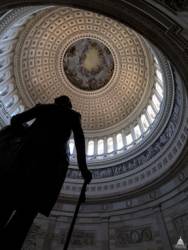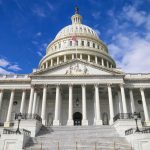 U.S. Capitol rotunda. Photo: Architect of the Capitol
U.S. Capitol rotunda. Photo: Architect of the CapitolSpace-Based PNT, National Executive Committee Public Release (March 14)
Space-Based PNT, National Executive Committee Public Release (March 14)
In prepared remarks before the Commerce, Justice, Science Subcommittee of the U.S. House Appropriations Committee on Friday (March 11, 2011), a high-ranking official of one of the world’s leading GNSS manufacturers characterized the LightSquared proposal to build 40,000 terrestrial base stations operating at a billion times the power levels of GPS signals as “a tectonic change” in the use of L- band spectrum.
Jim Kirkland, vice-president and general counsel of Trimble Navigation Limited, told the congressional committee members that “the new system not be deployed unless it can be conclusively guaranteed that the GPS users are fully protected from radio interference.”
Kirkland appeared as a late addition to witnesses addressing the appropriations subcommittee about the budget plans for a variety of federal agencies. The LightSquared initiative in the 1525–1559 MHz adjacent to the L1 GPS (and other GNSS) band, is in his words, “an issue of key importance to the National Telecommunications and Information Administration [NTIA] and all Americans.”
Among other responsibilities, the NTIA is charged with protecting spectrum that is used by government agencies as well as citizens in general.
“Spectrum is a public asset and it should not lightly be handed over at the behest of a private party," said Kirkland. "More fundamentally, the laws of physics cannot be waived by the FCC. This is a serious problem with no obvious solution.”
Trimble, along with Garmin and members of the U.S. GPS Industry Council, have intervened energetically in the Federal Communications Commission (FFC) move to waive restrictions on its own ancillary terrestrial component (ATC) rule regarding use of ground transmitters as part of mobile satellite communications systems. The company is also a member of the Coalition to Save Our GPS launched today (March 10, 2011).
“Initial technical analyses have shown that the distant, low-powered GPS signals would receive substantial interference from high-powered, close-proximity transmissions from a network of ground stations,” according to Kirkland’s testimony. “The consequences of disruption to the GPS signals are far reaching, likely to affect large portions of the population and the federal government.”
“The swath of spectrum where GPS satellites transmit, the L Band, has long been reserved for satellite to earth communications of various types,” Kirkland argued. “It is fundamental to sound spectrum planning that like uses be grouped together to ensure similarity of technical characteristics and avoid interference.”
He cited a long list of users groups and applications that would be harmed if LightSquared’s transmissions do, in fact, overpower GPS receivers: public safety, homeland security, consumers, aviation, transportation, agriculture, forestry, engineering and construction, utilizes, disaster management, scientific research, and surveying, mapping, and land management.
Kirkland noted Trimble’s and the GPS industry participation in the working group set up to examine the risk of GPS/GNSS interference under the FCC’s January 25 order regarding the ATC waiver, before adding that “we believe that additional safeguards are needed.”
His recommendations to the subcommittee were:
1. The FCC must make clear, and the NTIA must ensure, that LightSquared’s license modification is contingent on the outcome of the mandated study. The study must be comprehensive, objective, and based on correct assumptions about existing GPS uses rather than theoretical possibilities. The views of Lightsquared, as an interested party, are entitled to no special weight in this process.
2. The FCC should make clear that LightSquared and their investors should not proceed to make any investment in operating facilities prior to a final FCC decision (or at least make it explicit that they do so at their own risk). While this is the FCC’s established policy, it failed to make this explicit in its order.
3. Further, the FCC’s, and NTIA’s, finding that “harmful interference concerns have been resolved” must mean “resolved to the satisfaction of preexisting GPS providers and users.”
4. Resolution of interference has to be the obligation of LightSquared, not the extensive GPS user community of millions of citizens. LightSquared must bear the costs of preventing interference emanating from their devices, and if there is no way to prevent interference, it should not be permitted to operate. GPS users or providers should not have to bear any of the consequences of LightSquared’s actions.
5. This is a matter of critical national interest. There must be a reasonable opportunity for public comment of at least 45 days on the report produced by the working group and further FCC actions on the LightSquared modification order should take place with the approval of a majority of the commissioners, not at the bureau level.





